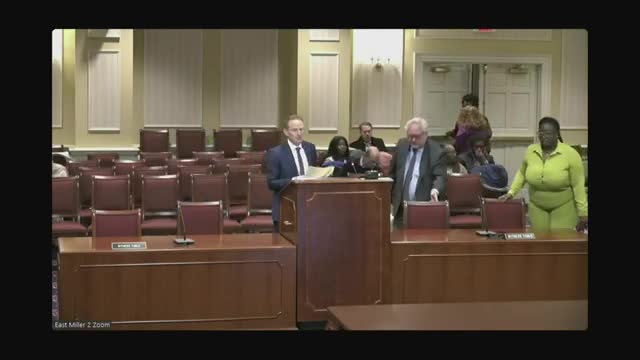Panel reviews bill to provide free prison communications; advocates cite family and reentry benefits, fiscal debate looms
Get AI-powered insights, summaries, and transcripts
Subscribe
Summary
Senate Bill 56 would require the state to take steps toward providing free or state-funded communications for people incarcerated in Maryland’s state prisons, Vice Chair Wallstreicher told the committee on Jan. 9.
Senate Bill 56 would require the state to take steps toward providing free or state-funded communications (including phone calls and modern tablet-based communications) for people incarcerated in Maryland’s state prisons, Vice Chair Wallstreicher told the committee on Jan. 9.
Wallstreicher said the bill both restores a work group to help plan implementation and delays full implementation by a year, combining prior approaches the committee has considered. The sponsor framed the measure as shifting the burden off incarcerated people and, importantly, their families, arguing that family contact improves reentry outcomes.
Mark Woodard of the Job Opportunities Task Force and Antonia Jeffrey of Worth Rises testified in support. Jeffrey presented an estimate that families pay an estimated $12,300,000 a year to the state’s telecom vendor (identified in testimony as Global Tel Link, GTL) and said the state could provide communications for an estimated $2,700,000 per year if the state negotiates lower vendor rates similar to other jurisdictions. Woodard said the coalition had met with Department of Public Safety and Correctional Services officials and described the department as engaged in discussions but not taking a formal position.
Committee members raised fiscal concerns. Several senators noted the state’s projected budget shortfall and questioned adding a mandated appropriation; one member cited Legislative Services’ (DLS) analysis placing recent expenditures around $9,300,000. Supporters said the DLS number reflects past spending at current contracted rates, while proponents argued the bill’s implementation would renegotiate vendor rates and lower net costs.
Questions from senators also touched on how other communications (letters, tablets) are paid for and whether the state can reliably negotiate lower rates with the telecom provider. Proponents pointed to experience in other states and cities where contract renegotiation followed similar policy changes.
No committee vote was recorded at the hearing; sponsors and proponents asked for a favorable report while acknowledging the fiscal questions would be central to the bill’s path forward.
